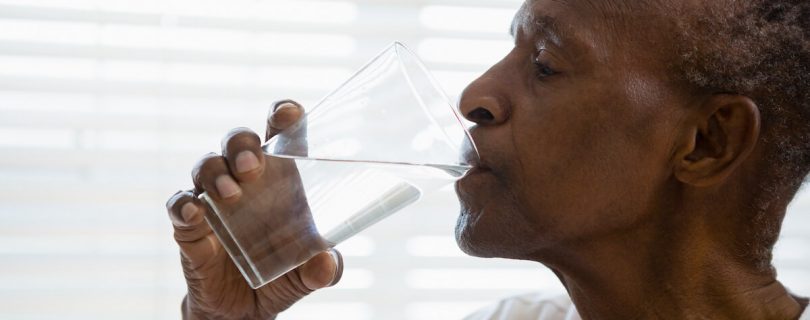
Why is Hydration Important for Older Adults?
In our daily lives, staying hydrated is crucial for maintaining overall health and well-being. For older adults, however, hydration takes on an even greater significance. With age, our bodies undergo various changes that can make it more challenging to maintain proper hydration levels.
At Park Place at Winghaven, a senior living community in O’Fallon, MO, we aim to explore why hydration is particularly important for older adults and the top benefits of staying hydrated.
Importance of Hydration for Older Adults

Hydration plays a vital role in keeping our bodies functioning optimally, affecting cognitive function, physical mobility, energy levels, and even mood regulation. Unfortunately, older adults are more susceptible to dehydration due to several factors, such as decreased thirst sensation, medication side effects, lowered kidney function, chronic conditions, or physical and cognitive impairments, including Alzheimer’s disease and dementia.
According to a study by the National Institutes of Health (NIH), individuals who maintain good hydration are generally healthier, develop fewer chronic conditions like heart and lung disease, and live longer compared to those who do not get enough fluids. Natalia Dmitrieva, Ph.D., a study author and researcher at the NIH, stated, “Proper hydration may slow down aging and extend a disease-free life.”
8 Benefits of Staying Hydrated for Older Adults
1. Improved Cognitive Function and Mood
Dehydration, the state of not having enough water in the body, can have detrimental effects on cognitive abilities and mood. When individuals do not maintain proper hydration levels, they may experience difficulties with concentration, memory recall, and overall mental acuity.
On the contrary, those who prioritize staying hydrated frequently note improvements in their focus, memory retention, and mental sharpness. Hydration not only impacts cognitive functions but also plays a significant role in mood regulation. By consuming an adequate amount of water, individuals can potentially elevate their mood, reducing feelings of irritability and confusion.
2. Enhanced Physical Health and Immune System
Water is crucial for maintaining optimal physical health. It plays a vital role in the body by transporting essential nutrients and oxygen to cells, which is fundamental for overall well-being.
Additionally, by keeping the body well-hydrated, individuals can enhance their immune system’s ability to combat infections and illnesses, promoting long-term health and well-being.
3. Better Digestion
Proper hydration plays a vital role in supporting good digestion. Water, the primary component of most bodily functions, aids in breaking down food in the stomach and intestines. This breakdown process, known as hydrolysis, helps to facilitate the body’s absorption of essential nutrients, ensuring optimal functioning and overall health.
4. Regulation of Body Temperature and Prevention of Heat-Related Illnesses
Older adults are more susceptible to temperature fluctuations. Proper hydration helps regulate body temperature, reducing the risk of heat-related conditions such as heat stroke and exhaustion. This is particularly crucial during hot weather or physical exercise.
5. Improved Cardiovascular Health
Staying hydrated supports the cardiovascular system by ensuring that blood volume and pressure remain within optimal ranges. This is particularly important for older adults, as proper hydration helps the heart pump blood more efficiently, reducing the risk of heart disease and other cardiovascular issues.
6. Enhanced Skin Health
Proper hydration is essential for maintaining healthy skin. Our skin becomes drier and more prone to irritation and infection as we age. Drinking enough water helps keep the skin hydrated from within, improving its elasticity, reducing dryness, and promoting a more youthful, radiant appearance. Well-hydrated skin also serves as a better barrier against external irritants and infections.
7. Better Joint and Muscle Function
Water is a critical component of the synovial fluid that lubricates joints and supports smooth, pain-free movement. Adequate hydration can help individuals maintain joint health by reducing stiffness and discomfort. Additionally, muscles rely on water to function correctly. Staying hydrated helps maintain muscle flexibility and strength, reducing the risk of cramps and injuries, particularly during physical or rehabilitation exercises.
8. Support for Kidney Health and Prevention of Urinary Tract Infections

The kidneys rely on adequate fluid intake to filter waste from the blood and produce urine. Staying hydrated supports kidney function and reduces the risk of urinary tract infections, which can be more frequent and severe in older adults.
–
Staying hydrated is only one element of health. At Park Place at Winghaven, we can help you lead a well-rounded, active, and healthy lifestyle through engaging programs and nutritious dining options.
We invite you to discover all that our senior living community in O’Fallon, Missouri, has to offer by scheduling a tour today.